- Home
- Steve Rasnic Tem
The Book of Days Page 2
The Book of Days Read online
Page 2
At sixteen Cal took the hunting rifle Cora had left his mother and set out to do what he’d dreamed of doing for the past four years: to track down his father in his hometown and murder him. Years later he would recall this trip as a quest for assassination, for his father was the king, the emperor, the monarch in absentia.
Why that particular September he wasn’t sure. But his mother had been increasingly paranoid that year, speaking of what might happen if her husband ever found them, imagining that he watched them from the woods at night, or that a distant figure in town was him. Cal thought it also might have something to do with his getting older, looking more and more like his father each day, and getting ready to leave. He’d done well enough in school that he was going to be able to graduate a year early, and as guilty as it made him feel, he was more than ready to leave this town. He didn’t want to hurt his mother, but there were too many ghosts and too much pressure– he was afraid he’d go crazy if he stayed much longer.
But he owed her something. And that particular Fall he was thinking he owed her his father’s death, a surgical removal of the source of her fear. It had made perfect sense at the time.
Now, he couldn’t help but think how leaving his own wife and children had seemed to make such good sense in the beginning. If he’d stayed he would have gone crazy; more importantly, he would have make his children crazy. Too much to be frightened of. His wonderful children to be frightened for. It had made such good sense at the time. A surgical removal of the source of his fear. Now he was far from sure.
That day in another September he had taken the bus the twenty-five miles to the small town where his father was supposedly living, the rifle wrapped in colored paper like an unusually long-stemmed bunch of roses. He’d gotten the idea from a movie. He’d even gotten the idea of the bus ride, he thought, from a movie.
When he got to the town it wasn’t all that hard to find his father. He tried a bar, then a pool hall, then a pool hall over a bar. His father came staggering down the outside staircase. Cal had no trouble recognizing him: he hadn’t changed from his mother’s pictures of him. But just to be sure he pulled one of those pictures out of his pocket. Badly creased, but the face was intact. He held it up to the light, and compared it to the figure of his father staggering his way. He did look like him, he thought, appalled. He looked more and more like him every day.
“Hey,” his father said, sounding angry. “Hey!” he shouted, stopping, pointing. “I know that picture you got in yer hand!”
Cal ripped the paper off the rifle. He held it to his shoulder. He aimed.
“Hey!” his father shouted. “I know you.” Incredibly, his father smiled.
“You don’t know anything,” Cal said with a bad taste in his mouth. “You don’t know.” His finger trembled against the trigger.
His father laughed. “Oh, I know you. Yer just like me. Just like me.”
Cal closed his eyes and lowered the gun.
He went to the bus station and waited until he could leave. Not surprisingly, his father didn’t follow him. He never saw his father again. He couldn’t remember what he had done with the rifle, but he never saw that again either.
Now Cal sat on the narrow front steps of his, his mother’s cabin, Cora’s cabin, and shook.
SEPT. 6
1991: The Soviet Union grants independence to the Baltic republics.
The first time he’d left this cabin, to go away to college, had been such an exhilarating experience that for a long time he would feel guilty about it, as if he had somehow betrayed his mother.
He’d felt no such excitement, no such sense of freedom when he left his family. He knew some men would feel such things, and he held on to that perception so that he might feel different from those men. But he knew he had done a terrible thing, continued to do a terrible thing.
His kids had seen enough made-for-TV movies to think that their dad had left so that he might have his freedom again. And he couldn’t really expect Linda to correct that impression. They might even think he was having a wonderful time.
Freedom to castigate himself over his lack of moral courage. Freedom to be alone.
No schedule except the one driven by his own guilt.
Sometimes he would wake up in the middle of the night after a dream of flying. In the dream his children were being shot at, chased by some sort of deranged maniac, or they were doing dangerous, crazy things: setting fire to themselves and others, holding their own heads submerged in the toilet bowl until they’d drowned themselves. Kids did such crazy things.
Instead of staying and trying to fix things Cal had stretched out his arms, beat his hands against his sides until he was bruising himself, beat his hands against his face until he was bleeding, and until he began lifting off the ground, flying away, escaping.
At some point in the dream he would fall to the ground, of course. And there the corpses of his children would be: laid out, waiting for him.
There was no place he could fly to without, eventually, finding their deaths.
SEPT. 7
1876: the James-Younger gang is badly shot up attempting to raid Northfield, Minnesota.
At midnight Cal was awakened by a grizzled man in a cowboy hat who beat down his front door and then hid in the corner behind a chair, six-gun drawn.
“Can I help you?” Cal asked sleepily.
“I’m makin’ mah escape, golly durn it!” the man cried, before shooting himself in the roof of the mouth.
At one AM a man burst through Cal’s front window and rolled around on the rug, tearing himself up on the shards of broken glass. “You gotta hide me!” he cried through broken teeth, before dying when a large dagger of window pane pierced his throat.
At two AM a man in buckskins fell out of Cal’s chimney. “Don’t let ’em git me!” he shouted, before using a Bowie knife to disembowel himself.
At three AM a young fellow wearing nothing but a bandanna stumbled out of Cal’s bathroom. “Ah can’t run no more!” he cried, slashing his wrists with Cal’s razor.
At four AM an old man with a twisted back crawled out from under Cal’s bed. Cal leaned over the side of the bed and stared down at him. “Been runnin’ too long,” the old man muttered, then died of natural causes.
At five AM Cal awakened to find the windows and doors all open, and every last thing in his cabin: clothing, food, furniture– even his own bed, gone. His life had finally escaped him.
SEPT. 8
1935: Louisiana Senator Huey P. Long is shot to death in Baton Rouge.
A simple scene: Cal was riding on a bus, his first day of college classes. All day he had been thinking of his father, dead in a barroom brawl less than two months before. Someone had told his mother, and she told him because he had a right to know. Propitious timing: an ending to the old life, a beginning of the new. No need anymore to think about reunions, reconciliations, long talks man-to-man. Somebody had taken care of all that for him.
The bus had pulled up at a street corner. Cal had looked out the window. A large man was falling to the sidewalk not more than ten feet away, his shirt blossoming bright red. A young boy, probably not quite out of high school, was pointing a black metal thing at the falling man, screaming at him. At first Cal actually thought that black thing was a cigar. The boy wore a torn T-shirt, and his nose and left cheek were badly bruised. A woman in a plaid housecoat stood beside him, screaming, hysterical. “Freddie! Freddie!” looking at the boy and then looking down at the large man pumping blood out onto the cement. Looking at him, Cal thought, not so much with horror, but with surprise, and with just the hint of disgust on her face as she watched what was happening to the man on the pavement. “Freddie! Freddie!” she cried. “He’s your daddy! You can’t kill your daddy!” Not so much as if it was one of the Commandments, but more like one of the Rules of the Road, Rules of the Game.
Meanwhile the boy was swinging the gun around excitedly, and everywhere people were running for cover. “I did it! I did it!” he crie
d, as if that explained something to the crowd. Then he looked at the woman in the housecoat, as if she were the only person with some chance of understanding. “I really did it, Mom!”
Then the bus pulled away, and Cal wondered if he had actually imagined the whole thing, but the television station that night covered the story, and the local newspapers the next day.
SEPT. 9
1956: Elvis Presley appears on “The Ed Sullivan Show” for the first time.
Cal stood in line at the post office, a fifty dollar bill clutched in his hand. The line was long– only one window clerk on duty today– and Cal felt himself grow more and more agitated the longer he had to wait. The fifty dollars was for stamps, which he would use to send letters to his family. That was the right thing to do, but he seriously doubted he would ever do it. Any letters he imagined writing would be full of guesses, half-truths, empty promises. He didn’t want to lie to them, and he had a poor sense of the truth these days.
He could write: I am a coward, over and over and over again. That would be the truth.
He’d never been good at writing letters in any case. After he’d gone away to college he’d written his mother only once. He wasn’t proud of that.
The clerk at the window gave him a selection of stamps. “For variety,” the man said, smiling. Cal said nothing.
Cal was on his way out the door when he saw the man with the slicked-back hair and sideburns, dark glasses. Applying stamps to countless letters, upside down, teenager’s code for “I love you.” Cal couldn’t stop himself. He went up to the man. “You know,” Cal said, “you look just like …”
“Uh-huh,” the man said without looking up. “That’s what they tell me.” And the man continued his work, applying stamps, applying them upside down. Cal looked at the letters. Each one was addressed, simply, “Momma,” with a street address he could not read, even though he leaned forward so far it would be obvious to the man that he was tryimg. “I love my momma,” the man said.
“Looks like you write her every day.”
“Uh-huh,” the man said.
“She write you back that often?”
“My momma’s dead,” the man drawled. Then he looked up at Cal. “But I reckon she needs my letters now, more than ever.”
Cal left the post office as the man began singing, a smooth lilt of country and rock in his voice, singing so softly he could barely hear, “Return to Sender.”
SEPT. 10
1955: “Gunsmoke,” TV’s longest-running Western, debuts on CBS.
Cal looked out his bedroom window that morning and saw a cowboy standing in the yard. The cowboy wore a huge white hat, as wide as a sail. A massive silver star spread across his chest like something growing there. His hands were poised above the pearl handles of his guns.
“Come on out now, Blackie! I ain’t tellin’ you agin!”
Cal pulled himself out of bed, saw the black hat like a shadow on his head, the guns splattered with blood strapped to his naked body. He didn’t want to, but he moved toward the door and out into the yard.
The marshal smirked. “I woulda let you put yore pants on there. Whut kinda man are you?”
“What do you want?” Cal moved slowly away from the house.
“I aim to take you in, Blackie. Dead or alive. You done made too many widows and orphans fer my taste!”
“You’re saying I killed people? I didn’t kill anyone.”
“You took them kids’ daddy away. You took Linda’s husband away.”
Without intending to, Cal found himself reaching for the gun. But instead of a six-shooter, it was a small child’s severed hand he was gripping. He dropped it and reached for the other gun. And came up with a doll, her face badly mutilated. He screamed.
“Yore gonna miss their birthdays, Blackie. So’s I guess the least you deserve is me blowin’ out yer candles!”
The man in the white hat fired. Cal desperately tried to remove his black hat, but it seemed glued to his head, bonded with his hair. The bullet approached slowly, indecisively, as if trying to determine for itself what kind of man he was.
Finally the bullet drifted to the ground and waited. Cal went back inside the cabin to go back to sleep. The bullet followed. The bullet got into bed with him.
SEPT. 11
1862: William Sydney Porter (O. Henry) is born in Greensboro, North Carolina.
1918: the Boston Red Sox win their last World Series, a year before selling Babe Ruth to the Yankees.
They called it the “Fall League.” Sandlot baseball. It would be the first time since he’d arrived here that Cal came into town for a social event.
It was a slow, gentle game. Twelve-and thirteen-year-olds, he guessed. Cal had always liked baseball. He’d taken the kids to several pro games, but most of the time they hadn’t caught the feel he’d wanted. They’d been too anxious, getting up and down all the time for food and the bathroom, and Cal had wanted too much, expected too much.
But one afternoon it had been almost perfect. The teams within one run all afternoon. The play graceful, the hitting powerful, the fielding masterful. Desperate catches and steals. And in the sun and the quiet day, his kids warm with excitement, and huddling close to him in their excitement. Exactly what he’d wanted– the pure pleasure of watching fine-tuned athletic performance, the sweet sound of bat, ball, and leather glove, the children thrilled with what their father had brought them to.
Cal had noticed two fathers sitting in the stands not that far away. “C’mon, son!” one would say. “That-a-boy, son!” the other would say.
The father closest to Cal– a bald man wearing a bowling shirt– had eyes that danced beneath his brow. His eyebrows would go up and down in their amazement at his son’s performance. Cal followed his gaze to the infield, where the sons of the two men played. The one son so graceful, so sure of himself, the other son slow, overweight, but trying so hard to please the father. Even when the athletic son committed the rare error the eyes of the man in the bowling shirt would dance with the pleasure of the son’s movements across ground, in air, through time.
The other man, wrapped in a dark plastic raincoat, frowned through most of the game. His eyes moved as well, but with shifts and darts of suspicion, feeling mocked. Once he looked right at Cal, suddenly knowing that Cal was watching him, and Cal turned away from the darkness of that look, to watch the fat son, stumbling, dropping the ball, trying so hard.
At the end of the game the sons came off the field to greet their families. Everywhere there were hugs, pats on the back.
The fat son came to the edge of the field and smiled at the father in the bowling shirt, whose eyes danced as he hugged his son and complimented him on his efforts.
The athletic son walked silently away a few feet from his father, whose raincoat flapped and clung, haunting the man’s progress out to the parking lot, and the family car.
SEPT. 12
1953: John F. Kennedy and Jacqueline Bouvier marry near Newport, Rhode Island.
Cal was in town the next day for groceries when he heard about the wedding. Two of the oldest families in the region were going to be joined and the entire town planned to attend. In fact, the wedding would be on public property– the large shelter by the bandstand in the town park. As it was almost time for the ceremony, Cal thought he’d wander over there.
His own wedding had been sparsely attended. Linda’s family had felt he’d never amount to anything, so they’d stayed away. He supposed with his recent actions they’d be feeling more justified than ever, although Linda might be too embarrassed to tell them he’d left.
Cal had had no family even to invite, so the wedding party had consisted of the young couple and a handful of mutual friends. Cal put together a tape of Vivaldi with Crosby, Stills, and Nash for wedding music. It had been a pleasant wedding, he thought. Linda had never been more beautiful. He had never been happier. He’d only wished that his mother had been alive. They’d written their own vows– and simple and childish as they migh
t seem now, they’d been heartfelt and sincere, and a pretty good basis for a marriage.
“I’ll always be there for you.” He’d promised that. But back then he hadn’t been afraid of anything, because he hadn’t yet realized he could lose everything.
The lovely young bride came walking out of the trees at one end of the park. Her gown was a dazzling white, her long train carried by a troop of little girls in pink dresses.
The groom in his tuxedo waited up on the bandstand. He had dark hair, and cheeks as pink as those of the bride. The minister looked happy and expansive. Several other handsome young men and women on the bandstand stretched their necks to get a better look at the approaching bride, as did almost every other member of the crowd.
Cal didn’t know if he was the only one to see the crone crawl out of the nearby bushes. Her clothes were dark tatters, and she was smeared with what appeared to be blood from head to toe.
As the bride neared the bandstand the old woman stepped in front of her, stopping the procession. “Do you know what yer doin’, girlie?” the old woman cried.
A few of the people in the crowd started shouting then. “It’s Old Lady Denkens!” the lady next to Cal said. Several men ran up to the old woman, their hands raised.
The old woman pulled a Mason jar full of blood out of her dress and threw it on the men. They sputtered, beating at their clothes, scattered back into the crowd.
“‘Spose he hold you he’d love you ’till the cows come home, dint he? Told you he’d be there forever. Give you anything you ever wanted– he promise you that? Don’t say he dint ’cause I know he did.”
The bride just nodded dumbly. People in the crowd started edging toward the woman, but suddenly the sheriff was on the edge of the crowd. “Let her be. Let her have her say,” he said, motioning them back. “That’s the best way. Then we’ll get on with the wedding.”
“Oh, you get on with it. You people get wedded and bedded. On and on it goes. Something in the blood, weddin’s and beddin’s is, but you never think about what it means to the woman, what she has ta give up for it.” She turned to the bride again. “He tell you you could go to work, after?” The bride shook her head. “He tell you you could go to school?” Again the negative shake. “I suppose he told you how many kids you’d be havin’?” The bride nodded. “Hell, girl.” the old woman spat. “Jus cause it’s in yore blood don’t mean you gotta let it drive you, do everythin’ the way it says. Bloods no bettern’ piss, I always say.”

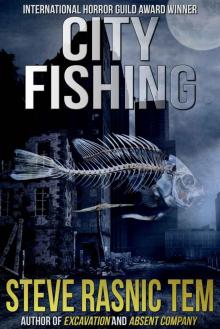 City Fishing
City Fishing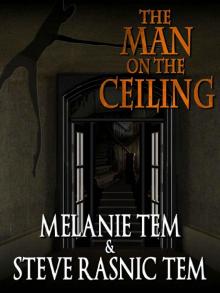 The Man on the Ceiling
The Man on the Ceiling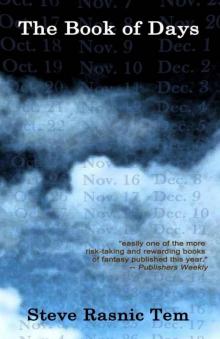 The Book of Days
The Book of Days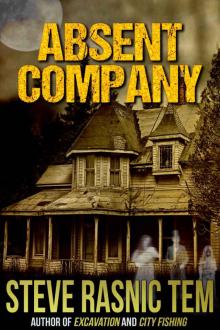 Absent Company
Absent Company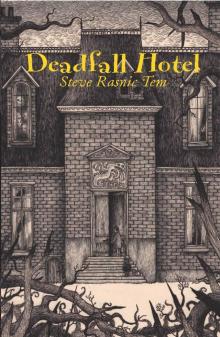 Deadfall Hotel
Deadfall Hotel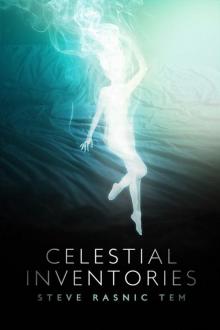 Celestial Inventories
Celestial Inventories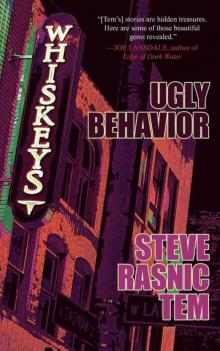 Ugly Behavior
Ugly Behavior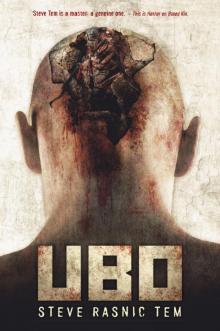 Ubo
Ubo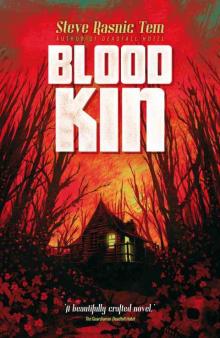 Blood Kin
Blood Kin